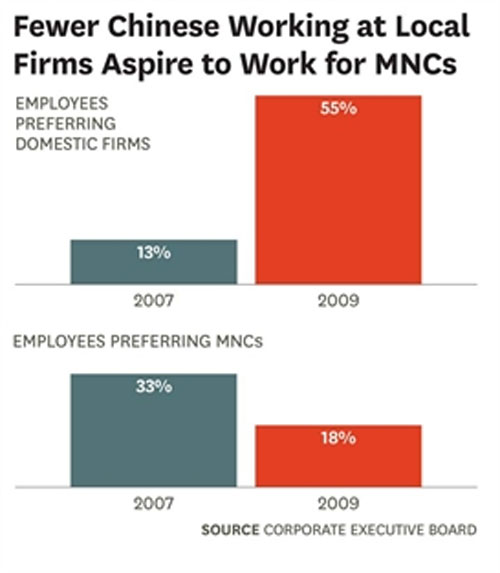From SCDigest's On-Target e-Magazine
June 1 , 2011
Global Supply Chain News: Will Recruiting and Retaining Top Talent be the Next Concern for Western Companies Operating in China?
New Study Says Chinese Nationals Now Prefer to Work for Chinese Companies, Not Western Multi-Nationals; Cisco Takes Actions to Make Employ Brand Attractive in China
SCDigest Editorial Staff
In addition to concerns about rising Chinese wages, will Western companies have a new concern when it comes to recruiting and retaining Chinese managers in their operations?
The answer is Yes, according to a new report from the analysts at the Corporate Executive Board (CEB), whose research says that "China's continued economic growth despite the global recession, as well as more compelling career opportunities, are viewed by recruits as good reasons to engage with domestic companies rather than those based in the West."
SCDigest Says: |
 |
| Cisco works hard to been its "employment brand" in China, "putting out broad messages about its employment value proposition and targeting key technical talent. |
|
What Do You Say?
|
|
|
|
CEB's Conrad Schmidt says that "Chinese talent is being aggressively recruited and employees get calls daily. What's more, multinationals are hard pressed to fend off the domestic attack, since the benefits that have been historically most attractive to this talent pool are no longer unique. In fact, many Chinese employers can match or beat them."
The CEB study found that Chinese companies are essentially viewed as equal to multinational brands in terms of employment preference by highly skilled employees. While the recession caused many Western companies to get Lean and pull back on recruiting efforts and in some cases have layoffs even in China, Chinese companies continued to hire and began providing many of the advantages multinationals were seen as uniquely offering before, such as attractive career development opportunities within a fast-growing company and quick promotions.
The study, based on survey data from some 300,000 Chinese managers over the past few years, also found that 40% of the Chinese employees at multinational companies indicated they believe that that the most desirable senior-level positions within Western companies operating in China are, and will continue to be, held by Western expatriates. This supports a perception held by many Chinese workers that a "glass ceiling" exists for them at Western multinational companies because expatriates in leadership roles are preferred.
CEB had earlier found a dramatic change in Chinese manager perceptions starting in 2008. As shown in the graphic below, in 2007, just 13% preferred to work at Chinese domestic firms, versus 55% who preferred multi-nationals.
By 2009, those figures were reversed, with 33% preferring Chinese-based companies, and just 18% multi-nationals. It is a reasonable assumption that a survey today would find the balance tipping even more in favor of Chinese domestic companies.

In a recent Harvard Business Review article, Schmidt points to the steps high tech giant Cisco Systems is taking in this growing war for talent in China.
(Global Supply Chain Article Continued Below)
|